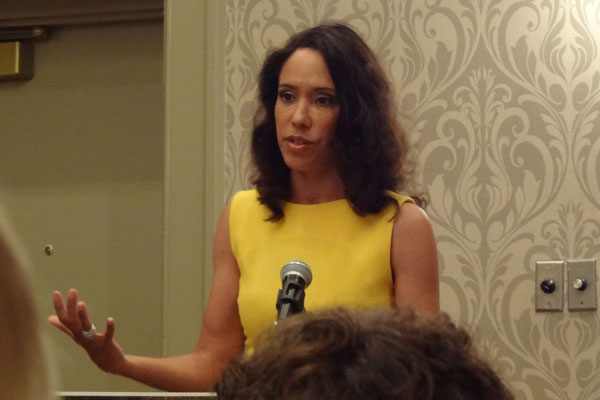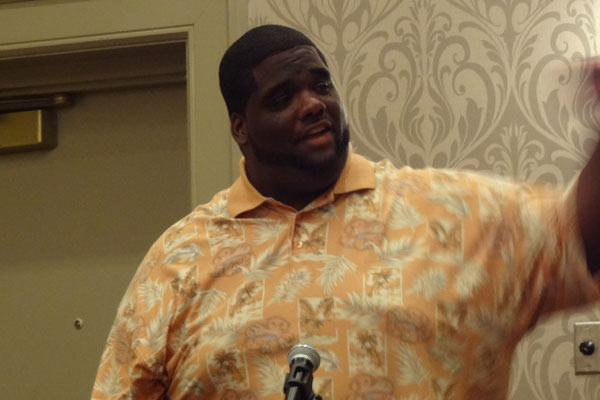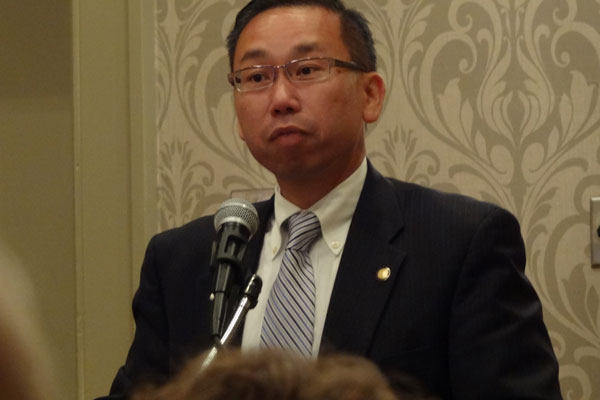Roosevelt Society and the Right’s Biggest Challenge
The Roosevelt Society‘s inaugural event, featuring Cranston Mayor Allan Fung and Crystal Wright, of ConservativeBlackChick.com, got to the core of the challenge now facing conservatives — even though not a single speaker or audience member mentioned it.
Unstated though it was, one attendee illustrated the problem perfectly after the applause had faded and the audience began dissipating. As I worked my way out of the room, being drawn into one small-group discussion after another, I happened to be in a standing circle when the topic of getting more people to attend such events came up. One young fellow, with a scraggly beard and long hair, said he has difficulty persuading people that “you don’t have to look like this guy” to come.
“This guy,” as indicated by the direction of his pointing finger, was me.
I’ll acknowledge that (following suggestions) I had worn a jacket and a tie to the event, and that I had actually shaved earlier, its being a church day. So, in fairness, I probably looked more the part of “those people who attend these events” than usual. What’s telling, though, isn’t the assumption that clean-shaven white guys in moderately formal attire are uniquely likely to spend a Sunday evening listening to an Asian politician and a black woman from Virginia talk political theory. What’s telling is that he thought it perfectly appropriate to single me out of a group of people — with a tinge of scorn in his voice — as a representative of some inverted modern-day class of demographic lepers.
The moment was a perfect encapsulation of the two themes that pervaded the evening, and if I may venture the observation (now that I’m wearing an old t-shirt and the stubble’s grown back in some), I’d suggest that reconciling them would be the greatest advance in reconfiguring the conservative movement and the Republican Party that can possibly happen.
The first theme was the larger of the two. As Crystal Wright put it: “We [Republicans] are not taking the message to anybody.” “Republicans refuse to build relationships with all Americans.” “You have to show up” in minority communities. She called it “leaning in to the American people.”
Asked to speak extemporaneously at the end of the program, Roy Bolden put it in a slightly different way: “The GOP has no right to what it hasn’t pursued.” Republicans should visit the minority neighborhoods in Providence and elsewhere. “Stop worrying about the color of your skin,” he said. “They don’t care.”
Where, he wondered, does that hesitance to make connections come from?
A former football player at the University of Rhode Island, Bolden founded Legions of Christ Ministries in Providence, which has as one of its ministries People United for Change, applying the moral and religious principles of the group more broadly, to economics and politics. Growing up in South Providence, and in his ministries, Bolden has witnessed the value that conservative principles can have for people in an area full of abuse, where “nobody has a father,” and where “nobody wants to be on welfare,” but nobody sees an alternative way to get by.
That testimony raises a necessary subtext to the complaint that Republicans and white conservatives don’t step forward into minority communities: Their values and ideas not only will be beneficial to people who are struggling, but will appeal to them, as well.
Wright stated that “conservatism is common sense.” Bolden used the example of an immigrant woman from the Dominican Republic, saying, “She didn’t ask for your help on that boat.” As the opening speaker, Mayor Fung used his parents’ story as his focus.
They came to the United States from China while Allan’s mother was pregnant with him and, as he says, chose the latter of the two options then available to Chinese immigrants in America: open a laundry or open a Chinese restaurant. Building their life in South Providence, they taught their son the importance of hard work and dedication, and as their business grew, they taught him the value of mobility, by improving their living situation with a move to Cranston.
In his speech, the principle of family values was indistinguishable from economic principles. The American Dream is a seamless garment of the two.
The other speakers repeatedly referred back to Fung’s story as an illustration that the conservative message can have appeal in minority communities, requiring only that it be well articulated.
They all agreed, as well, on the second theme of the evening. Fung put it gently, saying that Republicans are getting beaten because they’re “using the same blueprint” and don’t appreciate that “the ability to listen is the critical component.”
Wright was more direct. “The reason why we keep losing,” she insisted, “is that we abrogate our rights as ‘we the people’ to the people in the back room.” Despite our conservative vision of personal responsibility and individual action, we let a partisan establishment control our image and our message. In doing so, as Bolden put it, we “let the other side control the argument” through a caricature of that top-down image.
This theme flashed with its sharpest edge when the entire room (except for a quiet white guy taking notes for this column) seemed in agreement that conservatives need to be even faster to condemn, silence, and shuffle off the stage people who say stupid things — whether that means ignorant or just poorly phrased statements about sexual matters or the racist gamer handles of politicians’ teenage sons. These things stick, Wright suggested, because we’re “too slow to denounce the crazies.”
Crystal Wright: “Democrats have a lousy message, but great messengers.”
Put the two themes described above together, and the core challenge now facing conservatives emerges. How can an ideology that emphasizes the individual and promises to give people the room to succeed on their own develop into a broad-based political movement in opposition to an ideology that emphases group identity and a small technocracy’s redistribution of resources from disfavored groups to in-groups?
The Left doesn’t have better messengers; it has an ideological tolerance for unified, top-down messaging. When Democrats gaffe (or even, ahem, destroy the finances of states’ capital cities), their co-partisans don’t rush to denounce them. They ignore the flaws, change the subject, or even lie about what happened.
That wouldn’t work in a populist movement of fiercely independent factions, like the modern Right. But when standing in opposition to a lockstep line of Redcoats (whose commanders have proven willing to use the full force of the federal government for political advantage), the message to foot soldiers simply cannot be: “Go out into unfamiliar neighborhoods. Speak out. And if the opposition makes a ruckus about anything you say, we’ll throw you to the dogs.”
It’s a riddle, no doubt, but it may be that the first problem conservatives (Republicans… the Center-Right…) must solve is being able to explain to outside groups how, yes, some errors of thought can pervert our beliefs into something offensive, but without its invalidating the entire philosophy or requiring us to run around with puritanical denunciations. After all, the primary goal of the American civic experiment is arguably a system that allows people to work together where they can and to have the space to live (and speak) according to their own beliefs where they can’t.
Just as family values cannot be disconnected from economic principles, which cannot be disconnected from a preference for smaller government, the conservative coalition (by which we mean, nowadays, those who are classically liberal, per the U.S. founding) cannot turn its back on its full intellectual diversity. At the end of the day, only a movement in which a conservative black chick is able to stand side-by-side with an old guy with weird ideas about reproductive biology can be a movement that plausibly promises that you don’t have to look or think like “that guy” (meaning me) in order to better yourself and fully partake of all that our society has to offer.






